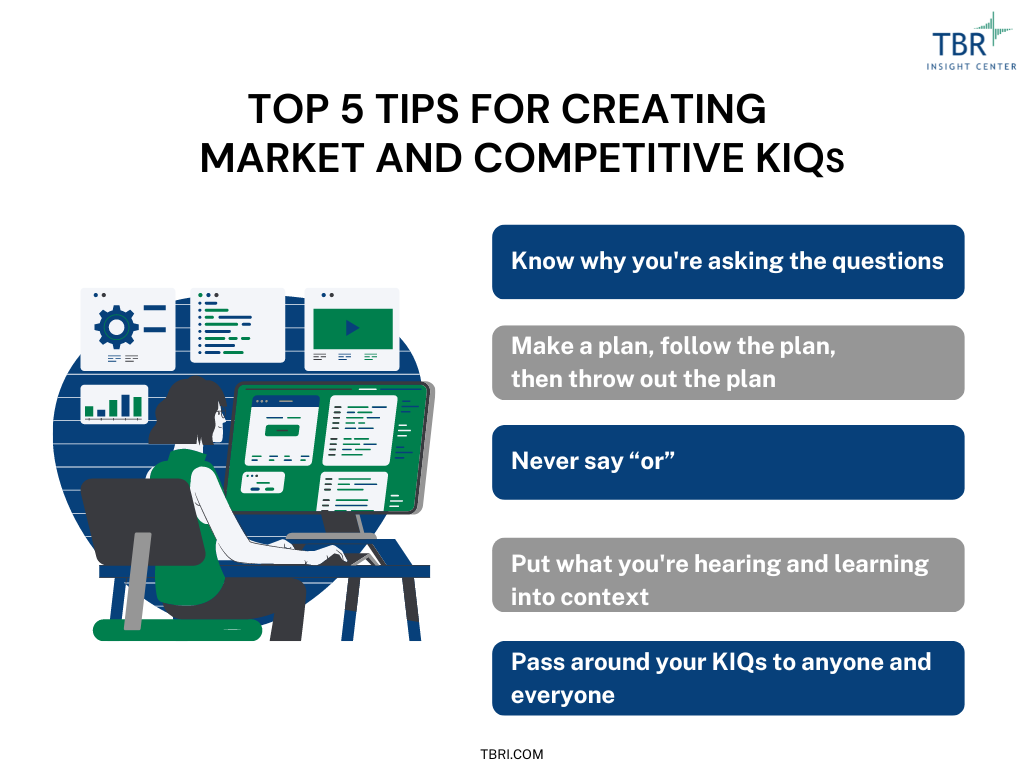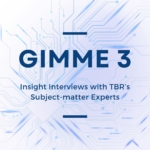Top 5 Questions To Ask When Creating Market And Competitive KIQs
Creating market and competitive KQIs
Simply gathering data and details as they come doesn’t help you move from information to intelligence in market and competitor research. Market and competitive KIQs (key intelligence questions) should always guide your discussions, and developing and deploying these KIQs require creativity and precision, mixed with experience.
At TBR we speak with people across the technology space, from partners in the Big Four consulting firms to CIOs migrating their company’s workloads to cloud and everyone in between. Captured by over 20 years in the business, check out our top tips for creating market and competitive KIQs.

Top 5 tips for creating market and competitive intelligence KQIs
- Know why you’re asking the question: With every market and competitive KIQ, you should be able to identify what you don’t understand and why you need an answer. You’re fishing to eat, not to throw the fish back. Why are you asking this person this KIQ? What do you expect the answer will be, and how do you follow up? What would surprise you? What if this person doesn’t know the answer? What will you know once you’re done asking the question? The more you focus on why you’re asking the question, the better prepared your question will be and the more useful the answers will be. How you frame the question — “Tell me about” or “In your experience” or “I’ve heard” — doesn’t matter if you’ve fully prepared on why you’re asking.
- Make a plan, follow the plan, then throw out the plan: Well-prepared KIQs follow a logical progression, building on each other and allowing follow-up questions that lead to another specific KIQ. The best market and competitive KIQs interlace and don’t need to be asked in any specific order. You can follow the natural path of the conversation and still tick through your KIQ checklist because you know precisely why you’re asking each question and exactly what you’re going to know at the end. In either case (and there is no “just wing it” option), accept that your intel gathering will not always go as planned. What worthwhile discussion ever does? If you spent time figuring out why you’re asking the question, you don’t need to worry about a script or checking KIQ boxes — the discussion will happen naturally.
- Never say “or”: Don’t lead into your questions with options, asking “is it this or that?” because the answer will almost always be “a little bit of both,” which is useless. It’s hard advice to adhere to—I don’t follow it myself half the time. You don’t want to sound foolish by leaving out an obvious option, but you do want to demonstrate that you know what you’re talking about. If you give two options, the response almost always leaves you guessing what really matters. Instead, just state the strongest case and get a reaction. For example, instead of asking, “Which impacts retention more, leadership or compensation?” say, “Retention challenges stem directly from bad leadership, right?” Again, this is hard advice to follow because it cuts against the natural flow of conversation and how we normally ask questions. But KIQs aren’t normal questions.
- Not all who wander are lost: You’ve got your finely honed questions, the perfect person to answer them and a good rapport—and you’re gathering up intel like a whale eating plankton. And then your source starts wandering, using your question to launch down a path so divergent you couldn’t even call it a tangent. This is on another plane, another planet. Wander with them, and quiet the voice in your head that’s trying to get back to the KIQs. Listen even more intently. And when you hear something that pops, that resonates with all you’ve been talking about or just piques your curiosity, ask them to go further. If they started down the tangent, they’re already invested in it. Demonstrate that you’re paying attention, as showing that you understand why they brought it up (even if you don’t) will simply open the source up further, potentially surfacing issues and intel you hadn’t considered or expected. More hard advice to follow, but consider that your preparation for the answers you expected around the KIQs means you don’t have to listen as intently, don’t necessarily have to draw connections and see different versions of the same picture. Now you need to work harder to put what you’re hearing and learning into context, and that effort should produce better, maybe even unexpected results.
- Pass around your KIQs, to anyone and everyone: Most likely you’re not the only one asking questions, and you’re not the only one who wants answers. Share your KIQs frequently, inside and outside your organization (if appropriate), and solicit feedback. A colleague having a casual conversation with some of your KIQs in the back of his or her mind might just help you do your job, uncovering something you might not have. And I’ve found, colleagues often challenge my thinking on the first tip — know why you’re asking the question — helping me refine my KIQs by asking my reasons and what I’m hoping to learn. You don’t need to put “Key Intelligence Questions: Go Ask These” in an email subject; just share them freely and listen to the feedback and answers.
Bonus tip — Make something up: Sometimes the best prepared KIQs and smoothest plan bring you straight into quicksand, leading your discussion to a series of “yes and no,” “on the other hand,” and “a little bit of both” answers. When this happens, make something up. “We’re seeing a huge uptick in interest around Brazil right now, not sure why.” If your fiction falls flat, you move on. In my experience, people love to talk, and when presented with something they hadn’t heard, disagree with, or have a strong opinion about, they’ll talk, regardless of the starting point. Should your creativity link to your KIQs? Or course, and wicked good preparation includes imagining what your source might not expect you to ask.
After all this, you might be thinking, “But what about structuring leading questions and selecting the right sources and understanding bias and all of those other basics of intelligence collection?” To quote the great British diplomat Harold Nicolson, “I have not forgotten them. I have taken them for granted.”



 Technology Business Research, Inc.
Technology Business Research, Inc.
Leave a Reply
Want to join the discussion?Feel free to contribute!